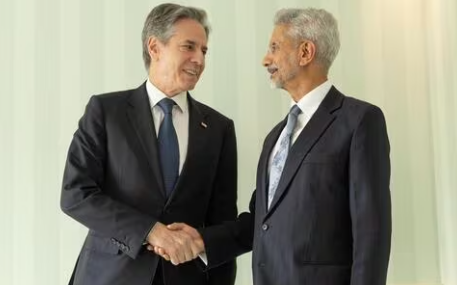Indian Foreign Minister Subrahmanyam Jaishankar and United States Secretary of State Antony Blinken engaged in high-level discussions here on Thursday, focusing on the evolving situations in West Asia and the Indo-Pacific region. The meeting, held on the sidelines of the Munich Security Conference, underscored the shared interests of both nations in promoting stability and prosperity across key strategic areas.
Against a backdrop of mounting tensions and geopolitical shifts, Jaishankar and Blinken delved into a range of issues affecting regional security and cooperation. Emphasizing the importance of dialogue and collaboration, the diplomats exchanged views on ongoing developments in West Asia, including the recent escalations in tensions and the prospects for conflict resolution.
Moreover, the Indo-Pacific emerged as a central theme of the discussions, with both officials reaffirming their commitment to upholding a rules-based order in the region. Amidst growing concerns over China’s assertiveness, Jaishankar and Blinken explored avenues for enhancing strategic cooperation among like-minded nations to safeguard maritime security and promote economic prosperity.
The meeting in Munich comes at a critical juncture, with global dynamics undergoing rapid transformations and uncertainties. As traditional alliances are tested and new challenges emerge, India and the United States stand poised to deepen their strategic partnership, leveraging their converging interests and shared values.
In a tweet following the meeting, Jaishankar expressed optimism about the prospects for enhanced cooperation between India and the United States, highlighting the importance of joint efforts in addressing regional and global challenges.
The discussions between Jaishankar and Blinken underscored the significance of multilateral engagements in navigating complex geopolitical landscapes and advancing shared objectives. As the Munich Security Conference continues, attention remains focused on the outcomes of such diplomatic exchanges and their implications for international relations.








 India
India












